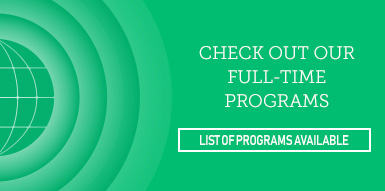-
Future Students
-
Admissions
Programs
Programs for Domestic Students
Courses
-
-
Current Students
-
Part Time
Student Logins
Student Logins
-
-
International Students
-
About Pace
-
About Pace
-
Career Change: How and when to change directions

We’ve got change on our minds over here at PACE. Maybe it’s the final preparations to welcome new cohorts of students into our programs, but likely, we’re not the only ones.
As approximately 150 new students prepare to start charting their path for a career change (or upgrade), we thought we’d touch base with some of our instructors to talk about when and why people decide to make a move from one career to another.
“Research suggests that Canadians can expect to have 15 jobs over the course of their career,” says Matthew Purdey, Founder and Principal Consultant at Foresight Career Coaching.
At PACE we have people coming to us looking for career advice, and typically hear “what should I take to get a great job”? Unfortunately there is no straight forward answer. It depends on your past experience (which we will get to later), your passions, and your natural strengths and abilities.
We truly believe you should do something you love, that way you will feel fulfilled and after all – only you can make you happy (it’s not the job, it’s how the job makes you feel). You’ve heard it before, but work-life balance is important. Aligning career aspirations and personal beliefs can help you to feel great about your career choices, so when the time comes to consider a career shift, you can say, “hey, how can I leverage my past knowledge to move forward, and keep moving forward.”
Matthew believes “Career development is not a straightforward, linear process. I see career change and career development as a dynamic, lifelong process,”
Both Matthew and Jonathan Bauer, People Director at SkipTheDishes agree that there is no "right time" to change careers. Depending on professional and personal circumstances, each person will be motivated in different ways.
“When things are going well, people tend to stay where they are. It’s when the situation changes, the work changes or the work feels different that people start thinking about their next career move,” says Matthew, who also says that typically there are two main categories of people pursuing career changes. Those who actively choose change and those who are forced to switch careers.
Active Change
People that choose to switch careers typically do so in response to, or in combination with, a major change happening in their life.
For instance, moving to a new country, being hurt or injured on the job, prioritizing mental health, wanting to find work that is motivating and/or challenging, finding work that supports a (growing) family or evolving values, to get out of or into an evolving industry, or to find a new way to spend their time in retirement, can all be catalyst for career change, says Matthew.
“For these people, the idea of leaving a "good job with steady pay" may prove difficult, but many do it to move toward their preferred future,” according to Matthew.
Jonathan says career change can also be prompted by a shift in focus. “When your focus shifts from being intentional about your career and your impact in the workplace to simply going through the motions, this might be a time to explore career transition; or maybe you only need a change of scenery or pace.”
If you find yourself in this position, take time to be thoughtful about change. Do your homework and research, so you feel confident in your decision. Do you need to upgrade go back to school to upgrade your credentials, do you want to transition into a new industry, or are you simply looking for a change of scenery and pace? There are many people you can talk too to help you navigate the decision, career counsellors, PACE’s recruitment advisors (email us to make an appointment!) or using the plethora of online resource available.
Forced Change
Then there is another group of people faced with career change that wasn’t so planned or perhaps even wanted.
“Good jobs with steady pay are harder to find and precarious work (term, seasonal, contract, gigs, etc.) is becoming more common.” says Matthew. “Many are forced to start over because their employment simply came to an end.”
Someone may be in the situation of a career change due to layoffs, downsizing, or as a result of technological changes in a sector, in which they are in the situation of a ‘forced’ job change. It can be a very scary, frustrating, and a difficult time, but having a positive attitude and the proper supports can result in new opportunities and a new, fulfilling career.
Mapping Your Way Forward
Change can be difficult, whether you are making an active choice or in a situation where you can’t help but have to explore new options.
The challenges of being faced with a career shift can include fear and uncertainty, losing one's professional identity, career and education planning, knowing which type/level of jobs to apply for, applying through the open job market, and getting noticed by employers without having industry experience.
And while this may sound disheartening, Matthew says being faced with changing careers can lead to a variety of benefits. From discovering new interests, learning new skills, to meeting new people and expanding professional networks, these are all be opportunities for personal and professional growth.
Either way, if you decide to make a change, Jonathan says you’re never really starting over.
“You're building on your experiences in life though work, school, and community activities,” he says.
Building on past experiences is a smart move, there is ALWAYS something from a past job that you can parlay into a new career. For example, someone that has worked in retail and now wants to work in the Human Resources, but is unsure of what skills they possess that are transferable. That person would likely possess leadership skills learned from working with a retail team, they would have experience in effective communications through working with the public, and excellent people skills. All these talents are highly sought after. Revisit that resume and make sure to highlight relevant skills.
Pursuing any type of paid or unpaid experiences can be a part of shifting the focus of your career. From exploring different paid-work, entrepreneurial ventures, continuing education and training, and volunteering each of these can help you move from one career to another.
Focus on Growth
If you are considering a careers, Jonathan says it’s important to remember that focusing on personal growth takes intentional effort and leads to the success of expertise.
“Consider when it is time to increase your efforts in your discipline and when it is time to take your learning down a new path.”
“When you find a group of people (or business) with shared visions and values and whom you trust - that might be the perfect time to take a risk and learn new skills and see how you can leverage your past experience, knowledge, and abilities to a succeed with a career pivot,” says Jonathan.
Regardless of whether you decide to actively pursue a change of career or are in a situation where you have to re-evaluate your opportunities, if you combine intention and align your personal values and interests in a way that matches labour market needs, you are free to explore options that move you toward your preferred future (whatever that may look like right now!).
Jonathan Bauer and Matthew Purdey both teach at UWinnipeg PACE. Each instructor brings their real-world experience and insights into the classroom, ensuring graduates are well prepared for the future of their chosen industry.







